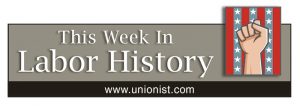This week in labor history: February 15-21, 2021
 FEBRUARY 15
FEBRUARY 15
1802 – Susan B. Anthony, suffragist, abolitionist, labor activist, born in Adams, Mass. “Join the union, girls, and together say: Equal Pay for Equal Work!”
1934 – U.S. legislators pass the Civil Works Emergency Relief Act, providing funds for the Federal Emergency Relief Administration, which funneled money to states plagued by Depression-era poverty and unemployment, and oversaw the subsequent distribution and relief
efforts.
1950 – The Congress of Industrial Organizations (CIO) expels the Mine, Mill & Smelter Workers; the Food, Tobacco & Agricultural Workers; and the United Office & Professional Workers for “Communist tendencies.” Other unions expelled for the same reason (dates uncertain): Fur and Leather Workers, the Farm Equipment Union, the Int’l Longshoremen’s Union, the United Electrical, Radio and Machine Workers.
FEBRUARY 16
1870 – Leonora O’Reilly was born in New York. The daughter of Irish immigrants, she began working in a factory at 11, joined the Knights of Labor at 16. A volunteer investigator of the Triangle Shirtwaist Factory Fire of 1911, she was a founding member of the Women’s Trade
Union League.
1883 – Diamond Mine disaster in Braidwood, Ill. The coal mine was on a marshy tract of land with no natural drainage. Snow melted and forced a collapse on the east side of the mine, killing 74.
1926 – Beginning of a 17-week general strike of 12,000 New York furriers, in which Jewish workers formed a coalition with Greek and African American workers and became the first union to win a five-day, 40-hour week.
1936 – Rubber Workers begin sit-down strike at Goodyear Tire and Rubber Co.
1959 – American Wire Weavers Protective Association merges with United Papermakers & Paperworkers.
2011 – All public schools in Milwaukee and Madison, Wisc., are closed as teachers call in sick to protest Gov. Scott Walker’s plans to gut their collective bargaining rights.
FEBRUARY 17
1937 – Sixty-three sit-down strikers, demanding recognition of their union, are tear-gassed and driven from two Fansteel Metallurgical Corp. plants in Chicago. Two years later the U.S. Supreme Court declared declared sit-down strikes illegal. The tactic had been a major industrial union organizing tool.
1992 – Two locals of the Hotel Employees and Restaurant Employees Int’l Union (now UNITE HERE) at Yale University in New Haven, Conn., strike in sympathy with 1,300 graduate student teaching assistants who are demanding the right to negotiate with the university.
FEBRUARY 18
1834 – One of the first American Labor newspapers, The Man, is published in New York City. It cost one-cent and, according to The History of American Journalism, “died an early death.” Another Labor paper, N.Y. Daily Sentinel, had been launched four years earlier.
1918 – Faced with 84-hour workweeks, 24-hour shifts and pay of 29-cents-an-hour, fire fighters form The Int’l Association of Fire Fighters. Some individual locals had affiliated with the AFL
beginning in 1903.
FEBRUARY 19
1909 – American Federation of Labor issues a charter to its new Railroad Employees Department.
1910 – A few weeks after workers ask for a 25-cent hourly wage, the Philadelphia Rapid Transit (streetcar) Co. fires 173 union members “for the good of the service” and brings in replacements
from New York City. Striker-scab battles and a general strike ensued.
1968 – Journeymen Stonecutters Association of North America merges with Laborers’ Int’l Union.
1975 – The U.S. Supreme Court decides in favor of salesclerk Leura Collins and her union, the Retail Clerks, in NLRB v. J. Weingarten Inc. — the case establishing that workers have a right to request the presence of their union steward if they believe they are to be disciplined for a
workplace infraction.
1979 – Int’l Union of Police Associations granted a charter by the AFL-CIO.
1986 – Farm Labor Organizing Committee signs agreement with Campbell Soup Co., ending seven-year boycott.
FEBRUARY 20
1834 – Responding to a 15 percent wage cut, women textile workers in Lowell, Mass., organize a “turn-out” — a strike — in protest. The action failed. Two years later they formed the Factory Girl’s Association in response to a rent hike in company boarding houses and the increase was rescinded. One worker’s diary recounts a “stirring speech” of resistance by a co-worker, 11-year-old Harriet Hanson Robinson.
1908 – A rally for unemployed work seekers becomes major confrontation in Philadelphia, with 18 arrested for demanding jobs.
1917 – Thousands of women march to New York’s City Hall demanding relief from exorbitant wartime food prices. Inflation had wiped out any wage gains made by workers, leading to a high level of working class protest during World War I.
1990 – United Mine Workers settle 10-month Pittston strike in Virginia, Kentucky and West Virginia.
FEBRUARY 21
1868 – A state law was enacted in California providing the eight-hour day for most workers, but it was not effectively enforced.
1969 – Transportation-Communication Employees Union merges with Brotherhood of Railway, Airline & Steamship Clerks, Freight Handlers, Express & Station Employees.
1972 – United Farm Workers of America granted a charter by the AFL-CIO.
(Compiled by David Prosten, founder of Union Communication Services)


Leave a Reply